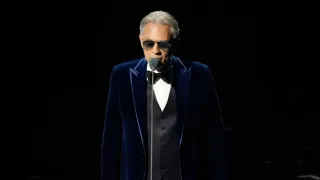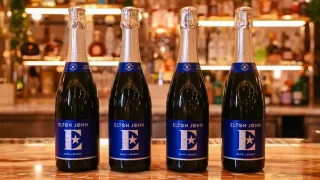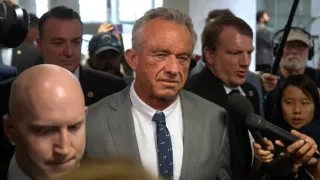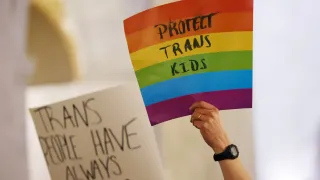February 1, 2023
Biden Lawyer: FBI Finds no Classified Docs at Beach House
Eric Tucker, Colleen Long, and Zeke Miller READ TIME: 4 MIN.
The FBI searched President Joe Biden's vacation home in Rehoboth Beach, Delaware, on Wednesday without finding any classified documents, the president's attorney said. Agents did take some handwritten notes and other materials relating to Biden's time as vice president for review.
The search, disclosed by Biden's personal lawyer, was the latest discomfiting moment for a president who has sought to contrast his sensitivity to rule-following with that of his predecessor Donald Trump, who faces a criminal investigation into his handling of classified documents.
Wednesday's search, the third for a Biden home or office, was an extraordinary development for a sitting president, and made clear that an investigation that had simmered quietly for weeks was continuing rather than fading away as Biden, who has said he was surprised by an earlier records discovery, presumably hoped.
The attorney, Bob Bauer, said FBI agents spent three and a half hours searching the home and that, "No documents with classified markings were found."
Biden's attorneys revealed last month that they had undertaken their search of the home without turning up classified materials. The fact the FBI did its own search reflected the Justice Department's determination to retrieve any and all possible classified items rather than rely on assurances that such documents had been located.
In a statement disclosing the search, Bauer sought to portray the president and his team as fully transparent and cooperative. He described the search as "planned" and "a further step in a thorough and timely DOJ process we will continue to fully support and facilitate."
He did not mention Trump by name, but the statement seemed aimed at juxtaposing the Biden investigation with the Trump case, where months of fruitless Justice Department efforts to recover all the classified records taken to the former president's Florida estate, Mar-a-Lago, culminated in an August search warrant and the removal of nearly three dozen boxes of documents and other items.
Searches of Biden's former office and Delaware homes, by contrast, have all been done voluntarily and without a warrant.
The latest search follows the FBI's 13-hour, top-to-bottom check of his Wilmington, Delaware, home, where agents located documents with classified markings from his time as a vice president and senator and also took possession of some of his handwritten notes.
One week earlier, Biden's personal lawyers revealed that they had found a document bearing classified markings while searching the Wilmington property but said they had not found others during a separate inspection of the Rehoboth Beach home.
The White House did not disclose the Justice Department's investigation until last month, when it acknowledged the Nov. 2 discovery of a "small number" of classified documents by Biden lawyers as they closed an office at the Penn Biden Center, a think tank affiliated with the Ivy League school.
Though officials did not say so at the time, The Associated Press and other news organizations reported on Tuesday that the FBI had conducted a voluntary search of that office later in November.
A spokesman for the White House Counsel's office, Ian Sams, on Wednesday again defended the administration's public response, which has been delayed and uneven.
"I think we've been pretty transparent from the very beginning," he said. "We want to be careful to be very respectful of the integrity of that ongoing investigation."
Sams reiterated that Biden was working with Justice investigators.
"The president has been fully cooperative in offering unprecedented access to his home ... every single room of his home in Rehoboth as well as the one in Wilmington," he said.
The Justice Department declined comment on the Wednesday search.
Biden's lawyers have described the retention of the records as a "mistake." The Justice Department has historically brought criminal charges related to mishandling of classified records only when it can establish, among other things, that a person acted knowingly in improperly removing or storing sensitive records.
The Biden documents probe is being handled by a special counsel, Robert Hur, a former senior Justice Department official during the Trump administration who served as the top federal prosecutor in Baltimore. He is starting his work this week, inheriting a months-long investigation already undertaken by FBI agents and Justice Department prosecutors.
Attorney General Merrick Garland had assigned the U.S. attorney in Chicago, John Lausch, to conduct an initial review before announcing Hur's appointment last month.
In a separate effort that preceded the Biden probe, special counsel Jack Smith is investigating the retention by Trump of roughly 300 documents with classified markings that were taken from the White House to Mar-a-Lago. Agents last August obtained a search warrant to recover classified documents following what the Justice Department said were months of resistance by Trump and his representatives to return the records to the government.
Investigators in the Biden case have already conducted interviews, including of Biden's former executive assistant who helped oversee the packing of boxes that went to the Penn Biden Center. It is not yet clear if and when the Justice Department might look to question Biden himself.
The Bidens purchased their Rehoboth Beach home, which overlooks a state park adjacent to the beach, in June 2017, months after he left the vice presidency.






